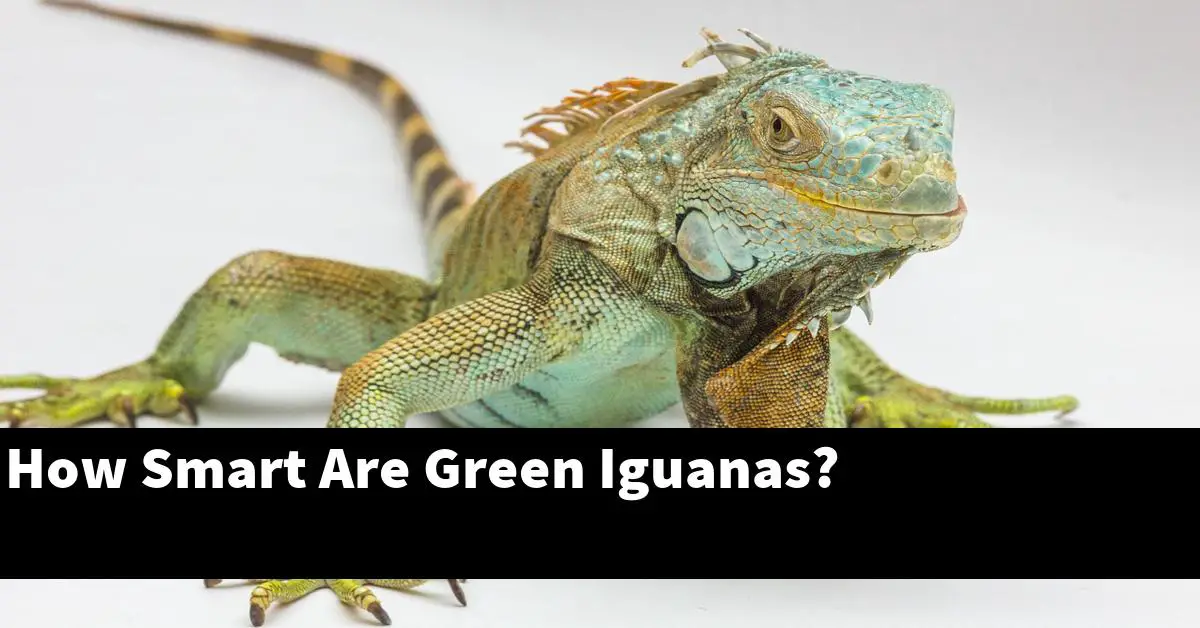Green iguanas are one of the most popular reptiles kept as pets. They are also one of the smartest reptiles. In this article, we will discuss how smart green iguanas are and some of the things they can do that show their high intelligence.
Table of Contents
Are iguanas intelligent?
Iguanas are a type of lizard that is native to tropical areas of Central and South America. Iguanas are known for their ability to climb trees and for their long tails. Iguanas are also popular pets.
Iguanas are not considered to be very intelligent animals. Studies have shown that iguanas have a very limited ability to learn and remember new information. However, this does not mean that iguanas are completely unintelligent. Iguanas are able to learn some basic behaviors, such as coming when called and eating from a dish.
They have the ability to learn and remember complex behaviors, and they are also very good at problem-solving. For example, green iguanas have been known to figure out how to open doors and escape from captivity. They are also very good at camouflage and can often avoid being seen by predators.
Iguanas are not as intelligent as some other types of lizards, such as to monitor lizards. However, they are still fascinating animals that can make good pets for people who are willing to put in the time to care for them properly.
Are iguanas smarter than dogs?
There’s been a recent debate on social media about whether iguanas are smarter than dogs. Some people seem to think that iguanas are smarter because they can learn tricks and follow commands.
Others think that dogs are smarter because they are more trainable and have a better sense of smell.

So, who is really smarter?
It’s tough to say who is smarter because it depends on how you define intelligence. If you think that being able to learn tricks and follow commands is a sign of intelligence, then iguanas are definitely smarter than dogs.
If, however, you think that being able to be trained and having a keen sense of smell are more important indicators of intelligence, then dogs are the clear winner.
At the end of the day, it’s up to you to decide which animal you think is smarter. But, one thing is for sure, both iguanas and dogs are pretty amazing creatures.
How do you know when your iguana is happy?
There are a few key indicators that you can look for to determine if your iguana is happy.
- First, observe your iguana’s body language. A happy iguana will often be active and alert, with its tail held high. Its eyes will be bright and clear, and it will be moving around its cage or enclosure frequently.
- Secondly, listen to your iguana’s vocalizations. A happy iguana will make chirping or clicking sounds, which are generally considered to be signs of contentment.
- Finally, take note of your iguana’s eating habits. A healthy appetite is usually a good sign that your iguana is happy and thriving.
Do iguanas like to be petted?
Well, that all depends on the iguana. Some iguanas enjoy being petted, while others do not. It really depends on the individual iguana’s personality. If you’re not sure whether or not your iguana likes to be petted, it’s always best to err on the side of caution and not pet them.
Do iguanas show affection?
Most iguanas show little to no affection towards humans or other iguanas. In the wild, they are typically solitary creatures.
However, there are some captive iguanas that have been known to become attached to their owners. These iguanas typically enjoy being petted and may even purr when they are happy.
What does it mean when an iguana bobs its head?
Iguanas use their heads for a variety of communicative purposes, including bobbing. When an iguana bobs its head, it is generally considered to be a sign of aggression.
Iguanas will also bob their heads when they are trying to intimidate another iguana or when they are trying to assert their dominance.
Why do iguanas close their eyes when you pet them?
Iguanas are often thought to close their eyes when they are being petted as a sign of enjoyment, but this is not always the case. In fact, iguanas can close their eyes for a variety of reasons, including when they are feeling threatened or when they are trying to protect their eyes from bright light. So, why do iguanas close their eyes when you pet them?
There are a few possible explanations. One is that iguanas are trying to protect their eyes from bright light. Iguanas are sensitive to light, and too much brightness can cause them to close their eyes. Another possibility is that iguanas close their eyes when they feel threatened. When an iguana feels like it is in danger, it may close its eyes as a way of trying to make itself less visible.
Whatever the reason, it is important to be gentle when petting an iguana. Iguanas are delicate creatures, and too much handling can be stressful for them. If you do pet an iguana and it closes its eyes, be sure to give it some time to calm down before you try to pet it again.
How to care for your green iguana
As lizards go, the green iguana is a relatively popular pet. They’re not too difficult to care for, but there are some things you need to know to keep your iguana healthy and happy.
First, you need to provide a suitable habitat. Iguanas are arboreal, meaning they like to climb, so you’ll need to give them a tall cage with branches or other structures to climb on. The cage should also be big enough for your iguana to move around freely; a good rule of thumb is to provide at least 10 square feet of space per iguana.
Iguanas are also tropical animals, so you’ll need to provide a warm, humid environment for them. A good way to do this is to install a basking spot near the top of the cage where the iguana can warm up. The basking spot should be around 95 degrees Fahrenheit.
You can create a warm, humid environment by misting the cage with water several times a day and using a reptile fogger or misting system.
It’s also important to provide your iguana with a diet that’s rich in vegetables and fruits. Iguanas are herbivores, so their diet should consist of about 80% vegetables and 20% fruits.
Some good vegetables for iguanas include collard greens, kale, and squash. Fruits such as mango, papaya, and berries are also a good source of nutrients for iguanas. In addition to fresh vegetables and fruits, you can also feed your iguana commercially prepared iguana food.
Providing your iguana with the proper care will help ensure that it lives a long and healthy life. By following these simple tips, you can be a responsible iguana owner and provide your pet with the best possible care.
What do green iguanas eat?
Green iguanas are omnivorous lizards that originate from South and Central America. In the wild, their diet consists of a variety of fruits, vegetables, and insects.
Fruits and vegetables make up the bulk of a green iguana’s diet. Common fruits include mangoes, papayas, and melons. Green iguanas also consume leafy greens such as romaine lettuce and collard greens.
Insects are an important part of a green iguana’s diet as they provide essential nutrients and protein. Common insects include crickets, mealworms, and waxworms.
Summary
In conclusion, green iguanas are very smart animals. They are able to learn new things quickly and remember them for a long time.
They are also good at problem solving and can figure out how to get to food and water that is out of reach. Green iguanas are great pets for people who are looking for a smart, friendly, and low-maintenance animal.

